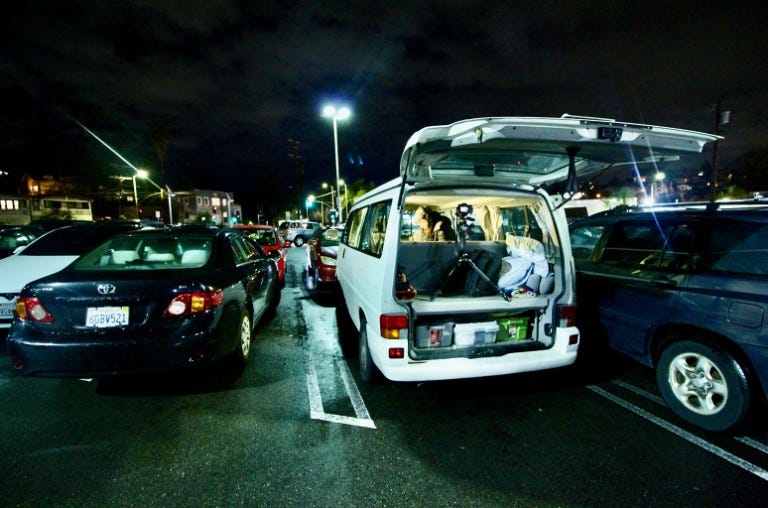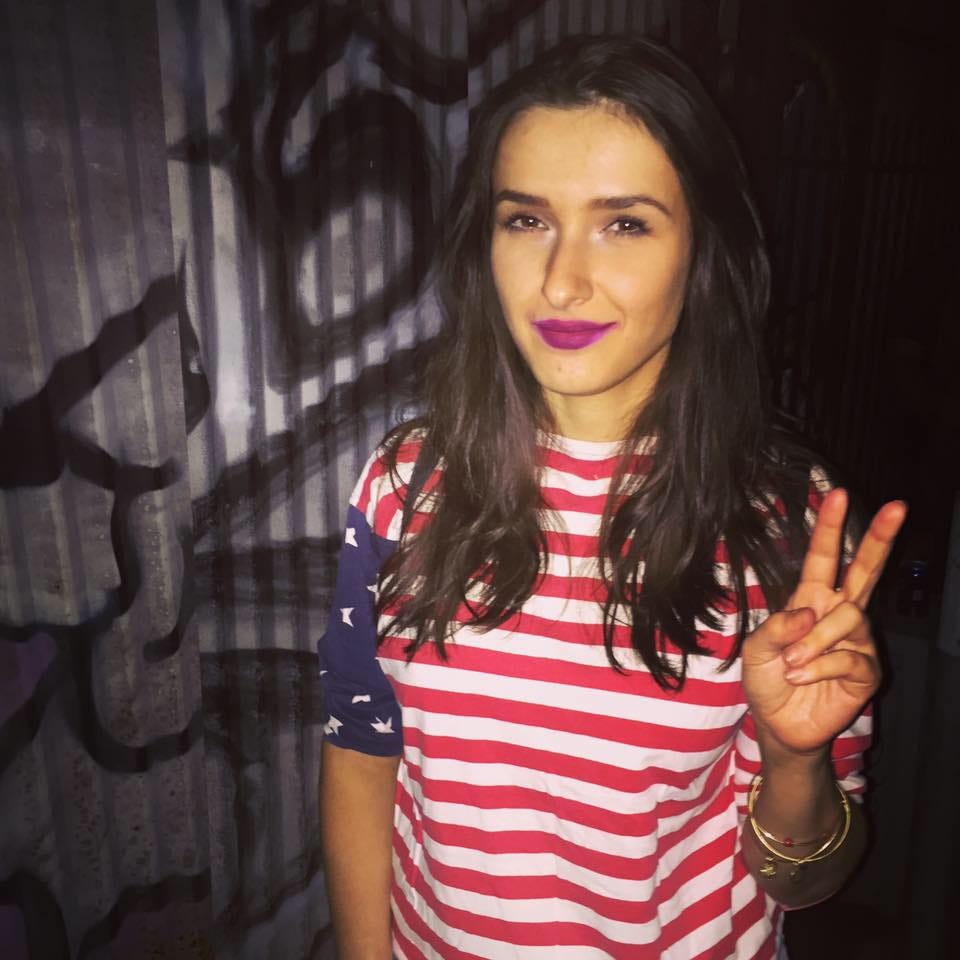The Most Social Thing I'll Do All Week
A drive-in concert in a parking lot is the ultimate post-corona social hack.
It had been 24 hours since the mayor ordered bars and restaurants to shut down, and the streets of LA were eerily deserted, dark and heavy with skunky whiffs of weed. The supermarket we pulled into was closed but the parking lot was packed, 50 cars back-to-back. Some honked as we rolled through, past smatterings of people standing around in the freezing cold, taking videos with their phones. Others were tailgating, and I saw one guy bump his elbow against the glass window of a car in greeting. Everyone else were just dim silhouettes in the dark anonymity of their cars; many had come solo. “Of course Reggie Watts is here, chilling in his Tesla,” whispered my friend Andrea, “If there’s a good party in LA, he’s there.”
We were gathering for one of the most radical social experiments of the post-corona era: a drive-in concert in the parking lot of a supermarket. The guerilla event was organized by a crew of experimental musicians in collaboration with online radio station Dublab, after their residency at local venue Zebulon became the latest victim of a city-wide moratorium on public gatherings. So instead the musicians hauled their gear into a white van, drove to a big lot, and started playing their sets, using a hyperlocal FM transmitter to broadcast the music to everyone within close radius. The concept was ingenious. While many post-corona events have migrated to the digital space, livestreams just don’t cut it as substitutes for the visceral joy of listening to music in a dark room with your friends. But cars are readymade buffers for social distancing, and pretty much everyone in LA has one. Safe within our private incubators, we could listen to the music alone, together.

Photo by Andrea Domanick for Billboard
So I wiped down my friend’s bowl with sanitizer and took a big hit, perching my feet on the car dashboard and craning my neck to the stars. A deep voice floated through the radio: “Here we all are, I hope we can find some solace in this moment, because I think we’re all feeling a little lonely—” said the musician Ben Babbitt, introducing his set, “—I know I am.” Warm washes of ambient music crackled through the stereo, glimmering synths fading into static fuzz and textures trailing one another in a delicate, drifting slow dance. When the performance ended, a chorus of car horns and flashing lights served as applause.
After the show, a few people lingered by the van, and I hesitantly approached them. One of the event organizers, the musician Celia Hollander, started explaining the concept: “It’s funny, when I first thought of this idea, I didn’t think I would do it,” she said. “We already spend all day alone in our cars, doing this just seemed so isolating. But now, this is the most social thing we will do all week...” Suddenly she stopped. “We should give each other more distance” she said anxiously, and we all quickly took a few steps back. A delirious laugh escaped from my chest. It would have been funny, this circle of people shouting a conversation at each other, if it wasn’t so sad. Still, just standing there was giving me a serious dopamine hit, sending physical waves of pleasure through my body. For the first time in my life, social interaction felt like a nutrient, and a gift.
But it was getting late, and after a few minutes we all said goodbye and headed back to our isolation caves. As cars pulled out of the lot, I caught the eye of a stranger and we exchanged forlorn smiles, as if sharing a secret.
Welcome To Rave New World
This is my newsletter about sex, drugs, and rave culture. I’m bringing this baby back from a hiatus to give you a behind-the-scenes look into my work + party, Weed Rave, plus interviews with my friends doing cool shit. Drop me a comment if you like what’s going on—or better yet, send me a tip! Lol I used to know a guy who would Venmo me to critique his dick pics. But that’s a story for another newsletter (paid tier?) BTW, you can always follow my quarantine exploits on Instagram and Twitter.
Recent Work
I wrote this month’s cover story on Grimes for The Face! She is deeply distrustful of journalists and being misquoted so we did the interview over email, which means I didn’t meet her, so I wrote a weird sci-fi fanfic instead. I also found out what her favorite raves are, but her publicist wouldn’t let me ask if she does acid. I also wrote about the history and evolution of weed strain names for Playboy’s last print magazine (RIP), and accidentally uncovered a shady world of marketing scams?! The only way to know for sure that you’re smoking a certain strain is to grow it yourself, apparently. Speaking of which…
Baby’s First #SponCon

Lately I’ve been feeling the urge to escape this hellish dimension and I’m sure you do too, which is why I’m excited to partner with Double Blind—a new psychedelic magazine run by women—to launch a digital course on growing mushrooms at home. Yes bitch, it’s time to grow your own shrooms!!!! Five percent of proceeds will be donated to Decriminalize California, the campaign to decriminalize psilocybin in CA. Head here to sign up before April 14, and use discount code “michellelhooq” for 50% off!
LHOOQ BOOK: Andrea Domanick, Music Journalist on the Coronabeat

I wanted to chat with my friend Andrea because she’s been on the corona beat for the last few weeks, covering the crisis’ impact on the music industry and churning out articles like a BEAST. Andrea and I met when we were both music editors at VICE and she now writes for The LA Times, Billboard, and others. You can follow her on Twitter.
Hey Dre! What have you been working on?
It’s been almost two weeks since corona has become a beat for me, and the story has changed so rapidly. My piece on Tuesday for Billboard was an uplifting story about creative ways artists are banding together to find workarounds for the shitty hand they’ve been dealt. We’re harnessing technology and social media to reclaim a bit of this world that’s gotten away from us, and that’s really good.
The opposite is this other story I’m working on about how the most vulnerable workers in the live music industry are being impacted—essential people who don’t get the limelight, like a merch guy whose tour was cancelled, and the woman who runs the backstage catering for all the big festivals. She had this one quote, “rock and roll is consistent,” to describe how much people depend on this work. That’s my big takeaway: these aren’t seasonal workers. The lighting guys, tour managers, people who build structures—they can’t livestream their way out of this.
I feel like the first wave of corona stories was all about the cancellations. Where do you think the conversation is heading next?
The really interesting place I wanna take it is how music is going to fit into the national conversation about economic policies. The concern is how so many people in the music industry don’t qualify for unemployment because they’re seasonal or freelance. Tour managers are losing two to three months of work, many of whom have spent thousands of dollars to get visas and need to spend more to get back to their home countries before borders close. It’s going to be a really interesting test of the gig economy because so much of our workforce has shifted to that in the last 5-10 years, and the music industry is going to be really well poised to help lead what is going to become a national conversation. That’s where the term “gig economy” comes from: live musicians.
What?! I didn’t know that.
Yeah! Musicians have been living the gig lifestyle for generations, and this is a great opportunity for them to be like, hey, remember us too. The music industry has been a harbinger of many things, it was first with piracy and digital streaming. So much of the industry is already dealing with AB 5, this new freelancer law in California that is actually very bad for most freelance workforces, particularly in the music industry. But I’m rambling… sorry, I’m a little stoned.
Heh, no worries. Both of us are freelancers, have you thought about how this is going to impact journalists too?
It’s weird because this is the busiest I’ve ever been in the year I’ve been freelance. I keep thinking this is a reminder of why we need journalism—no one is gonna be able to fake news their way out of this. I hope we’re getting more work out of it. It’s rekindled what makes me excited to be a music journalist—music can be such a harbinger of what’s happening in the rest of the world.
Last question: Any lingering thoughts about the drive-in concert we went to?
I keep thinking about the thing Celia said to us: she spent three months planning this residency in Zebulon, and put this drive-in concert together in three days. And the concert was arguably more innovative and connective of an experience than a Zebulon show would have been. It was just a nice, grounding thing when everything feels so vertiginous right now.
Yeah, to me it was DIY culture at its purest: super creative, community-oriented, and not centered around making money at all.
An experience that operated outside any system of capitalism… it’s very heartening that something like that can happen.


